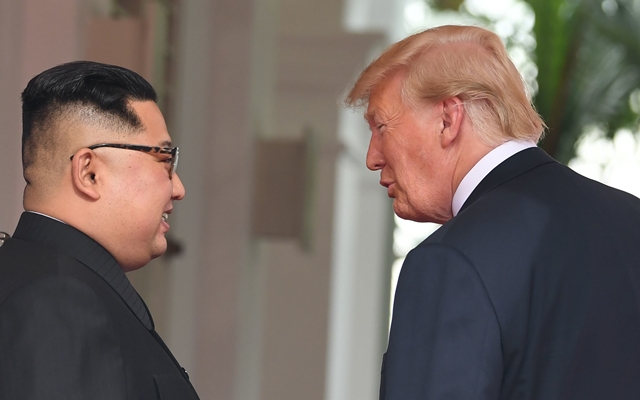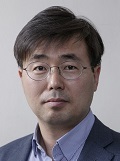 |
|
North Korean leader Kim Jong-un (left) and US President Donald Trump speak during the North Korea-US Summit in Singapore on June 12. (Yonhap News)
|
All leaders need successful negotiations to further political careers
“Welcome to Washington. And good luck!” This was the greeting think tank officials and foreign affairs sources gave me when I first arrived in Washington, DC, three weeks ago as a foreign correspondent. The “good luck!” message seemed sincere, more than just a formulaic exchange. At least one person commiserated over my having arrived in the US “in the era of Trump’s insanity”; more than few expressed their “sympathies.” They painted the image of a rough road ahead with President Donald Trump’s unpredictable approach to governance and the seemingly endless tug-of-war with Pyongyang. Amid all of this, there were some people who offered comfort. “Things are actually quiet right now, so it’s a very good time to adapt,” said one think tank expert. The present moment has indeed been quiet compared to the months of extremes and massive change between the threat of war on the Korean Peninsula last year – as exemplified by Trump’s remarks about “fire and fury” – and the North Korea-US summit in Singapore this past June 12. It also means there has been no further momentum in the implementation of the leaders’ agreement since the Singapore summit. The June 12 summit alone has been enough to put North Korea-US relations on a very different level. None of the people I encounter in the US now are talking about the threat of North Korean ICBMs or Trump taking military action against the North. The focus of my conversations has been questions like “What sort of agreement can North Korea and the US reach?” or “Will Kim Jong-un come to New York for the UN General Assembly this September?” It’s a major turnaround from the situation recalled by journalists and civic group representatives who spent last year in Washington, when they said their “focus was on somehow stopping a war from happening.” But we cannot afford to simply let the march toward denuclearization, peace, and prosperity for the Korean Peninsula and normalization of North Korea-US relations peter out here. The longer we go without progress, the more skepticism and fatigue there will be within Washington, Pyongyang, and Seoul – and the greater the chance Trump will lose interest in talking to the North. The three leaders are all well aware of why something needs to happen this fall. After putting an end to Pyongyang’s two-track nuclear and economic development approach and announcing the transition to an approach of “channeling all energies into building the economy” in his New Year’s address this year, Kim will need something visible to show his public in terms of the economy and the lifting of international sanctions.That will become an especially pressing concern around the Sept. 9 anniversary holiday honoring the establishment of the North Korean government. Trump, who faces difficulties at home with the Russia scandal, will want some achievement in the economy and foreign policy to tout for the midterm elections on Nov. 6. The outcome of those elections also stands to have a direct or indirect impact on Korean Peninsula policy. “If the Democrats take the House, there’s a good chance they will push to impeach Trump over the Russia scandal,” an expert at one progressive-leaning US think tank explained to me. “If that happens, Trump’s number one priority is going to be on defending himself against impeachment, while Korean Peninsula issues could end up on the back burner.” Ironic as it may sound, another variable is the strong current within the US Democratic Party that does not want Trump’s North Korea policy to succeed. South Korea needs to take this US political situation into account as it helps put implementation of Pyongyang and Washington’s implementation of the Singapore agreement onto a track they won’t be able to back out of. The driving force that has brought things to this point in the face of skeptical opinion and discouragement by advisors has been the commitment shown by Trump, Kim, and President Moon Jae-in. They are also the ones who hold the power to push things forward from here.
 |
|
Hwang Joon-bum, Washington correspondent
|







